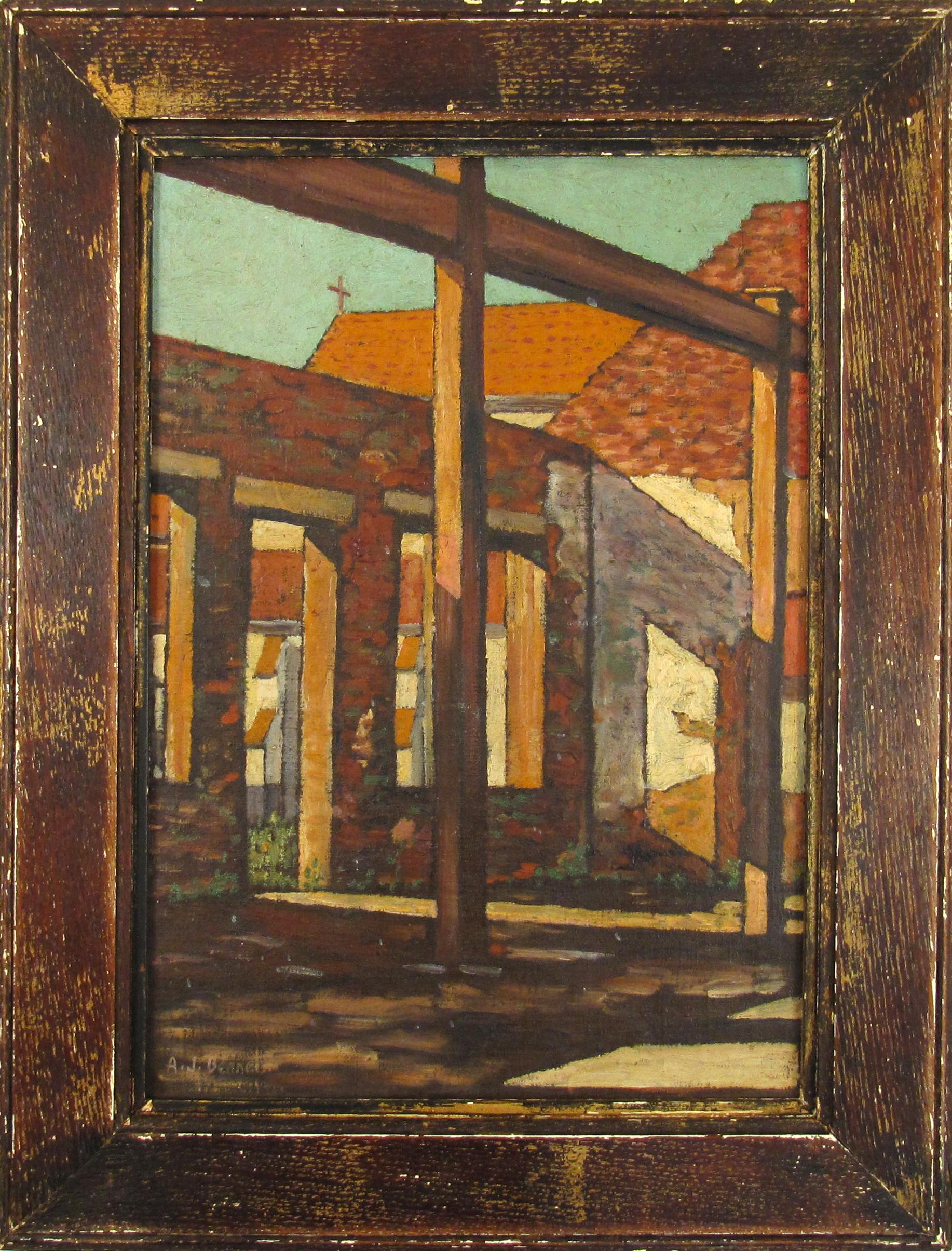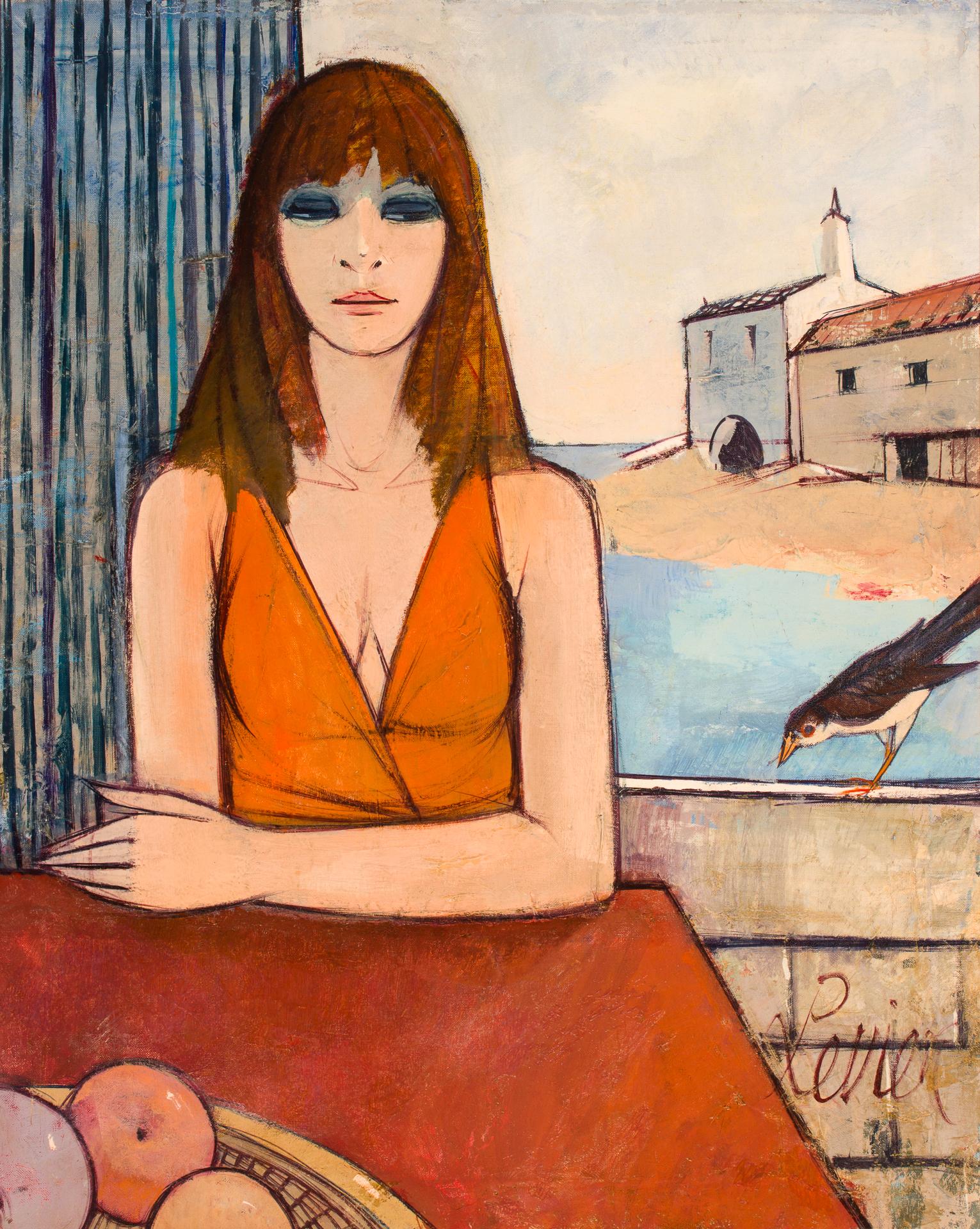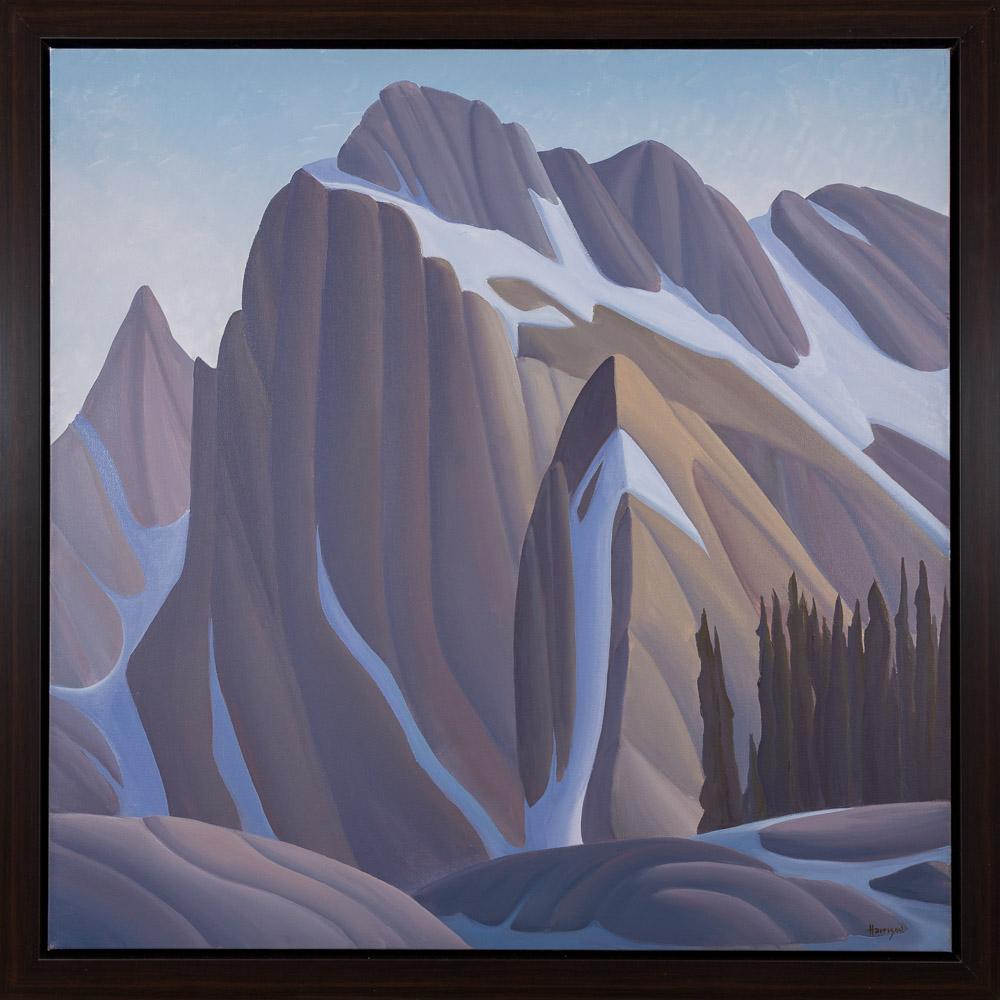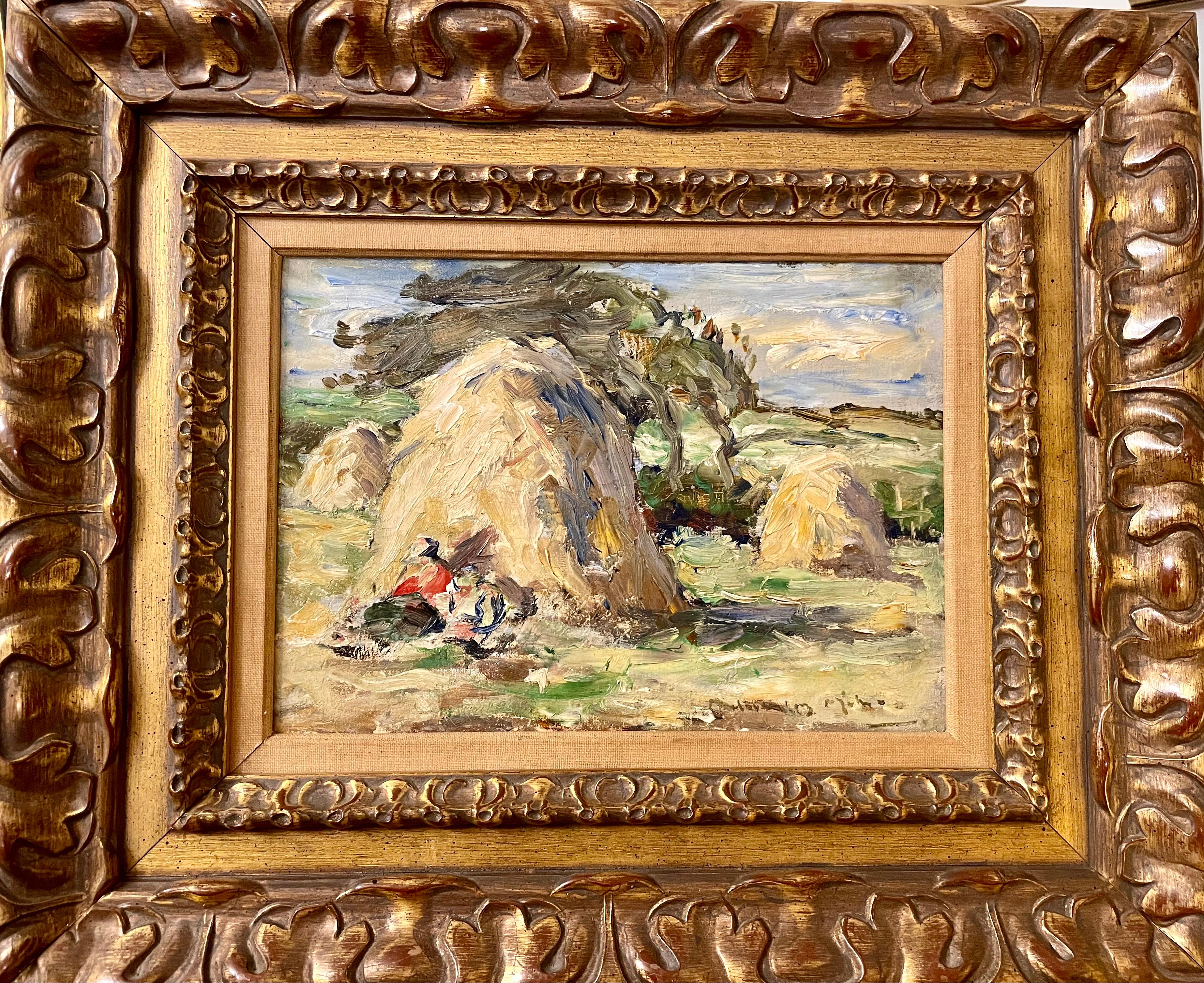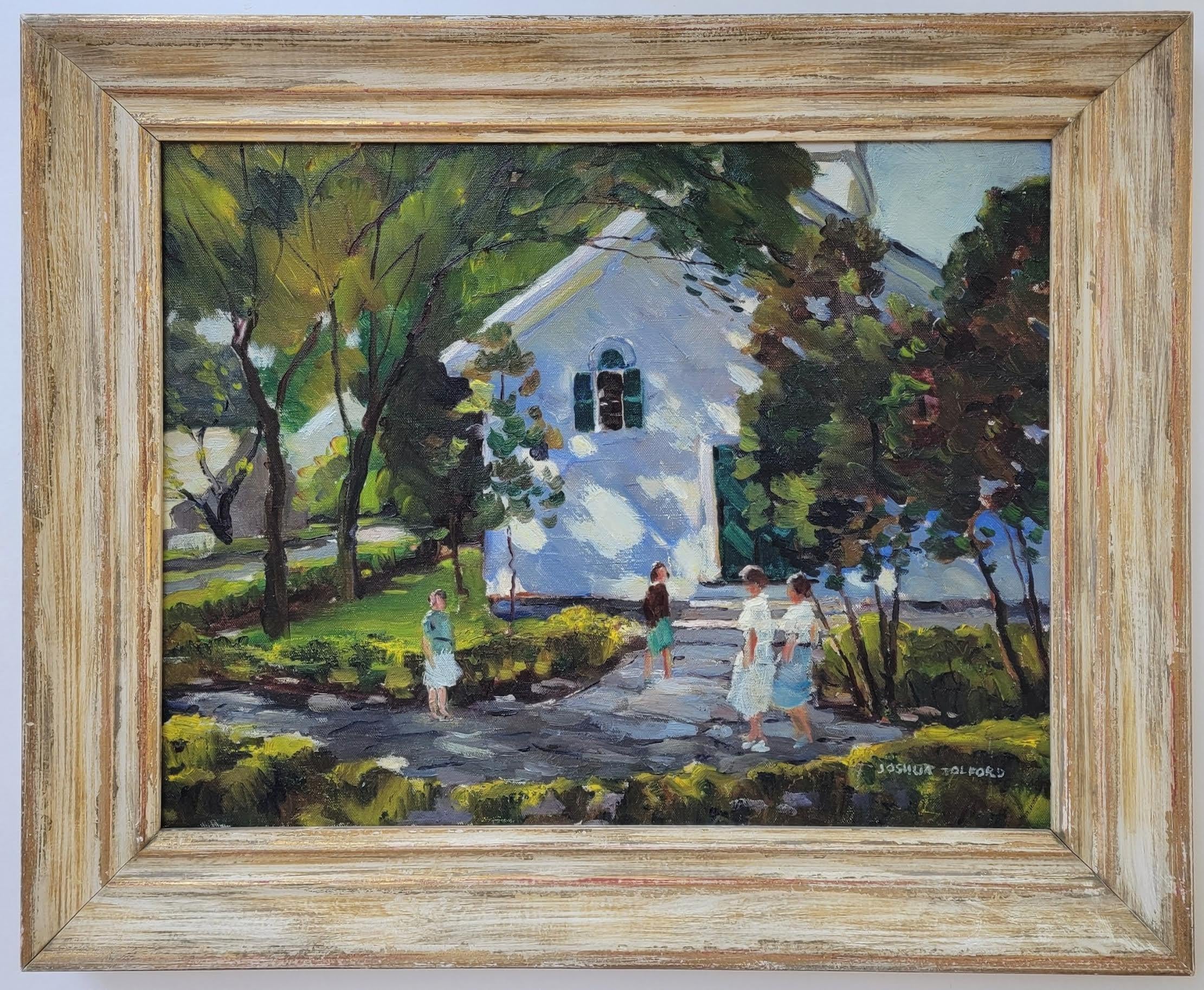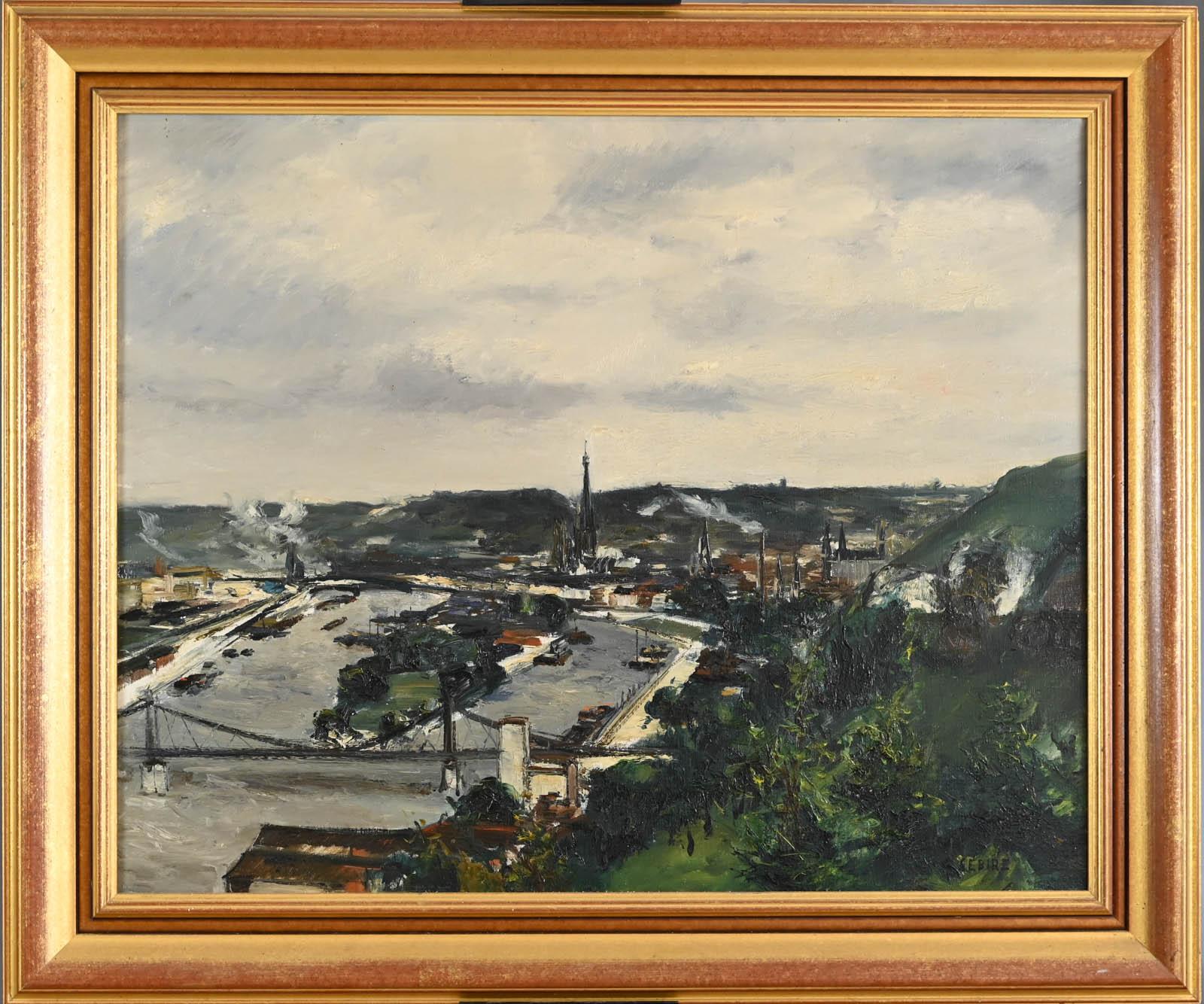Items Similar to Stormy Weather, Colchester by Lucien Pissarro - Landscape painting
Want more images or videos?
Request additional images or videos from the seller
1 of 9
Lucien PissarroStormy Weather, Colchester by Lucien Pissarro - Landscape painting1911
1911
About the Item
Stormy Weather, Colchester by Lucien Pissarro (1863-1944)
Oil on canvas
54.3 x 65.3 cm (21 ³/₈ x 25 ³/₄ inches)
Signed with monogram and dated lower left, 1911
Provenance: The Brook, 1949 (The artist's studio)
Leicester Galleries, Leicester, acquired in 1968
Private collection, acquired from the above
Thence by descent
Literature: Wendy Baron, The Camden Town Group, London, 1979, p. 268
Anne Thorold, A Catalogue of the Oil Paintings of Lucien Pissarro, London, 1983, no. 147, p. 91, illustrated
Exhibition: London, Galleries of the Royal Society of British Artists, Forty-Sixth Exhibition of Modern Pictures by The New English Art Club, 1911, no. 75
London, Carfax & Co Gallery, Paintings by Lucien Pissarro, 1913, no. 33, listed
New York, Findlay Galleries, Lucien Pissarro (1834-1944), 1966, no. 5
Canterbury, Canterbury Museum, Lucian Pissarro and his Influence on English Art, 1890-1914, 1984, no. 16, illustrated
Artist biography:
Born on the 20th February 1863, Lucien Pissarro was the eldest son of the Impressionist painter Camille Pissarro. Coached from a young age by his father and in the frequent company of figures such as Cézanne, Gauguin and Monet, it is no surprise that Lucien chose to pursue an artistic career. While he is best known as a landscape painter, Lucien was also a printmaker, wood engraver and printer of fine books, occasionally painting still lifes and portraits of his family.
Lucien first visited England in 1870 with his family when fleeing the Franco-Prussian war. It was the beginning of a great love affair with the country. He decided to move permanently to England in 1890, becoming an English citizen in 1916. Until then he had worked as a landscape painter and book illustrator in France. During this period he met and worked with painters such as Paul Signac, Georges Seurat and Vincent van Gogh. Moving simultaneously in Impressionist and Neo-Impressionist circles, Lucien exhibited Pointillist paintings with his father in the last Impressionist exhibition in 1886. In the same year he was one of the first artists to exhibit in the “Salon des Indépendants” as a Neo-Impressionist.
Despite his close relationship with his father, as revealed in their correspondence, Lucien showed remarkable independence of mind in his approach to his art. While Lucien was trained by his father, the influence the artists had on one another was reciprocal. Thanks to his relationship with Seurat and Signac, Lucien encouraged Camille to experiment with Pointillism, a characteristic of the Neo-Impressionist group.
Lucien’s move to England in 1890 allowed him greater freedom to pursue his interest in book illustration and printing. There Lucien and his wife Esther established the Éragny Press, named after the Normandy village where his family lived since 1884. The Éragny Press was principally notable for creating aesthetically pleasing books and paved the way for the development of European book art. Lucien’s illustrations for these books demonstrate his talent and command of colour.
Nevertheless, Lucien always considered painting his primary concern, particularly landscape painting. Continuing the tradition of the Impressionists, Lucien was a plein-air painter who liked to work outdoors and study the subject directly from nature. His landscapes reveal his fascination for the effects of weather and light. The contemporary art critic Frank Rutter described Lucien as a master of colour, writing in 1922: “there is no man living who has a more profound knowledge of the science of colour, or a more discriminating eye for its observation in nature.” Rutter was also struck by Lucien’s respect for his subject, nature itself: “Each canvas is wrought with a quiet perfection that conceals its art and is eloquent of the tender emotion which the loveliness of nature inspires in the artist.”
It is clear from Rutter’s praise that Lucien’s contemporaries were impressed by his combination of English and French artistic traditions. Unsurprisingly, he became associated with artistic groups that drew inspiration from the Impressionists, including the New English Art Club, with whom he exhibited in 1904, the Fitzroy Street Group in 1907 and the Camden Town Group in 1911. To his English contemporaries Lucien represented a direct link to the Impressionist Masters. His influence can be recognised in the work of British artists such as Spencer Gore, Harold Gilman and Walter Sickert, who acknowledged Lucien’s influence, writing in 1914: “Mr Pissarro, holding the exceptional position at once of an original talent, and of the pupil of his father, the authoritative depository of a mass of inherited knowledge and experience, has certainly served us as a guide.”
Since his first solo exhibition at the Carfax Gallery in May 1913, Lucien Pissarro’s work has been featured in countless exhibitions and galleries. During his lifetime Lucien donated his estate to the Ashmolean museum in Oxford, where a permanent collection of his work is still housed today. His works are featured in every major art museum in England, as well as the Musée d’Orsay in Paris, the National Gallery of Australia and many museums in the USA.
- Creator:Lucien Pissarro (1863 - 1944, French)
- Creation Year:1911
- Dimensions:Height: 21.38 in (54.3 cm)Width: 25.71 in (65.3 cm)
- Medium:
- Movement & Style:
- Period:
- Condition:
- Gallery Location:London, GB
- Reference Number:1stDibs: LU261213640812
About the Seller
5.0
Recognized Seller
These prestigious sellers are industry leaders and represent the highest echelon for item quality and design.
Platinum Seller
These expertly vetted sellers are 1stDibs' most experienced sellers and are rated highest by our customers.
Established in 1964
1stDibs seller since 2015
95 sales on 1stDibs
Typical response time: 4 hours
Associations
Society Of London Art Dealers
- ShippingRetrieving quote...Ships From: London, United Kingdom
- Return PolicyA return for this item may be initiated within 7 days of delivery.
More From This SellerView All
- Les Bateaux Lavoir, Paris by Georges Manzana Pissarro - River sceneBy Georges Henri Manzana PissarroLocated in London, GB*UK BUYERS WILL PAY AN ADDITIONAL 5% IMPORT DUTY ON TOP OF THE ABOVE PRICE Les Bateaux Lavoir, Paris by Georges Manzana Pissarro (1871-1961) Oil on canvas 38 x 46 cm (15 x 18 ¹/₈ in...Category
Early 1900s Post-Impressionist Figurative Paintings
MaterialsCanvas, Oil
- Chemin de la Vallée, Oil on Canvas by Paulémile PissarroLocated in London, GBChemin de la Vallée by Paulémile Pissarro (1884 - 1972) Oil on canvas 46 x 61 cm (18 ¹/₈ x 24 inches) Signed lower left, Paulémile. Pissarro- Signed and titled on the reverse Pro...Category
Mid-20th Century Post-Impressionist Landscape Paintings
MaterialsOil, Canvas
- Femmes Maroccaines by Marcel Dyf - River scene paintingBy Marcel DyfLocated in London, GBFemmes Maroccaines by Marcel Dyf (1899-1985) Oil on canvas 60.5 x 73 cm (23 ⁷/₈ x 28 ³/₄ inches) Signed lower left, Dyf 1957Category
1950s Post-Impressionist Landscape Paintings
MaterialsCanvas, Oil
- Petit Lavoir du Pont Pierre, Morêt-sur-Loing by Georges Manzana Pissarro, 1902By Georges Henri Manzana PissarroLocated in London, GB*UK BUYERS WILL PAY AN ADDITIONAL 5% IMPORT DUTY ON TOP OF THE ABOVE PRICE Petit Lavoir du Pont Pierre, Morêt-sur-Loing by Georges Manzana Pissarro (1871-1961) Oil on canvas 54.5 x ...Category
Early 1900s Post-Impressionist Landscape Paintings
MaterialsCanvas, Oil
- Le Coup de Vent by Paulémile Pissarro - Post-Impressionist oil river sceneBy Paul Emile PissarroLocated in London, GBLe Coup de Vent by Paulémile Pissarro (1884-1972) Oil on canvas 65 x 92 cm (25⁵/₈ x 36¹/₄ inches) Signed lower left, Paulémile Pissarro; signed and titled on the reverse Executed cir...Category
1940s Post-Impressionist Landscape Paintings
MaterialsCanvas, Oil
- La Mare et les Vieux Saules by Paulémile Pissarro, Post-Impressionist riverscapeBy Paul Emile PissarroLocated in London, GB*UK BUYERS WILL PAY AN ADDITIONAL 5% IMPORT DUTY ON TOP OF THE ABOVE PRICE La Mare et les Vieux Saules by Paulémile Pissarro (1884-1972) Oil on canvas 46 x 55 cm (18 ¹/₈ x 21 ⁵/₈ i...Category
1930s Post-Impressionist Landscape Paintings
MaterialsCanvas, Oil
You May Also Like
- A. J. Bennett - Light and Shade - Post Impressionist Painting, South Africa 1919Located in Meinisberg, CHA. J. Bennett (South African, fl. Early 20th century) Light and Shade • Oil on canvas artist board ca. 42.5 x 29.5 cm • Later frame ca. 53.5 x 41 cm Worldwide shipping is complime...Category
1910s Post-Impressionist Figurative Paintings
MaterialsCanvas, Oil, Board
- PrintempsBy Charles LevierLocated in Costa Mesa, CAA beautiful woman sits at an open window, gazing down at a small bird who has landed nearby in this serene portrait by Charles Levier. Warm orange tones are played off their complements in shades of blue, the artist utilizing several different layers of oils to create a subtle and relaxed view of a spring day near the sea. Beyond the window a small chapel sits on a peninsula, surrounded tranquil blue waters. This work, like many of Levier's, belongs to the French figurative movement of the Glorious Thirty (Les Trente Glorieuses) - the golden period of thirty years after WWII which were a time of great hope and prosperity in France. Inspired by Hollywood cinema, Charles Levier sought harmony in composition and purity of color and form. His said that his creations represented "a light and delicate world, of dark and subtle shades and colors." Levier worked in a somewhat abstracted, cubist style. Additionally he often employed the French technique of "cloisonnism" (after the French for "partition"), a style of post-Impressionist painting with bold and flat forms separated by dark contours, also seen in this work. The term was coined by critic Edouard Dujardin on the occasion of the Salon des Indépendants, in March 1888 and was commonly used by artists like Émile Bernard, Louis Anquetin, Paul...Category
Mid-20th Century Post-Impressionist Figurative Paintings
MaterialsCanvas, Oil
- Mount Whitney California Original Ken Harrison Contemporary Oil LandscapeLocated in Whitefish, MT"Mount Whitney, California" by Kenneth Harrison. Oil on Canvas, 36" x 36", 40" x 40" framed in a modern black floater. “My goal is to capture a peaceful relaxing moment on canvas” ...Category
21st Century and Contemporary Post-Impressionist Landscape Paintings
MaterialsCanvas, Oil
- Haystack with Resting FiguresBy John Maclauchlan MilneLocated in Hillsborough, NCScottish artist John Maclauchlan Milne, RSA, (1885-1957) is a contemporary of Scottish Colourists Peploe, Fergusson, Cadell and Hunter. Like the...Category
1920s Post-Impressionist Landscape Paintings
MaterialsCanvas, Oil
- Sunday Morning, 1950s by Joshua Tolford, First Baptist Church, Rockport, MABy Joshua TolfordLocated in Grand Rapids, MIJoshua Tolford (American, 1910-1985) Signed: Joshua Tolford (Lower, Right) " Sunday Morning ", circa 1950s First Baptist Church, Rockport, Massachusetts Oil on Canvas 16" x 20" Housed in a 3" Frame (Newcomb Macklin Molding) Overall Size: 21 1/4" x 25 1/4" Appears to be in very good condition. Ready to hang. Included with the item is an original photo postcard...Category
Mid-20th Century Post-Impressionist Landscape Paintings
MaterialsCanvas, Oil
- Vue de RouenBy Gaston SebireLocated in LE HAVRE, FRGaston Sebire (1920-2001) Vue de Rouen Oil on canvas Size : 65 x 81 cm Signed lower right Provenance : Private Collection, France Very good condition. Original canvas. Frame included...Category
1960s Post-Impressionist Landscape Paintings
MaterialsCanvas, Oil
